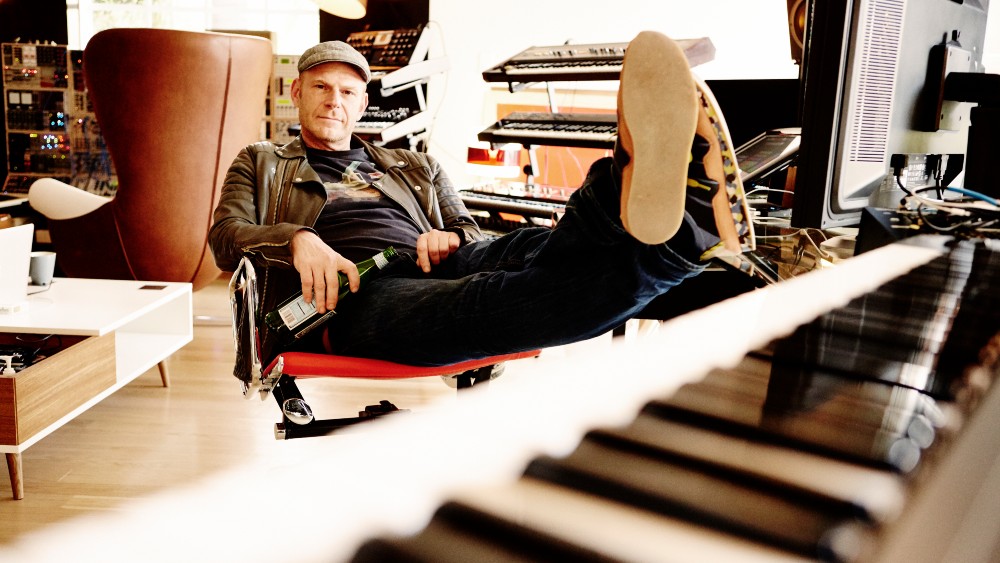
Whether it’s due to his Dutch roots or his background in the world of DJing and electronica, Tom Holkenborg (or as he was formally known, Junkie XL) has always felt like one of the bigger enigmas within the world of modern film scoring. Whenever you listen to one of his scores, either while watching a movie or separately, your mind immediately starts delving through the complexities of what Holkenborg is doing both musically and sonically to help elevate the filmmaker’s work on screen.
That is definitely the case with Holkenborg’s most recent two scores for Zack Snyder’s Justice League, which debuted in March, followed quickly by his score for Adam Wingard’s Godzilla vs. Kong last month. Any fan that feels that six hours of new music from Holkenborg just isn’t enough, his score for Zack Snyder’s Netflix movie Army of the Dead will come out in the next few weeks.
Even before his latest trilogy, Holkenborg had been impressing cinephiles with his musical work on George Miller’s Mad Max: Fury Road — many are still befuddled how that score didn’t get one of the film’s ten Oscar nominations — his collaboration with Hans Zimmer on Snyder’s Man of Steel and Batman v Superman: Dawn of Justice, and his score for the blockbuster superhero hit, Deadpool.
Below the Line spoke with Holkenborg over Zoom a few weeks back for the following interview:
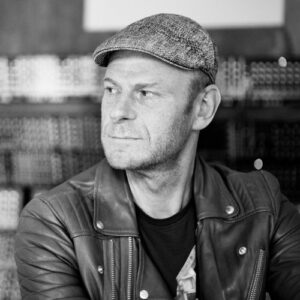
Below the Line: To start, what was your entry into Godzilla vs. Kong? Did Adam contact you or was it something that came up naturally from your previous work with Warner Bros?
Tom Holkenborg: The movie was initiated by Legendary, and they released all these Godzilla property movies. Adam was hired to direct this movie, and Adam was looking for a composer who could deal with that kind of scope of movie with both Kong and Godzilla in it. I have a great working relationship with Legendary, so they suggested, “Well, why don’t you talk to Tom, and see if you guys hit it off,” and we really did. Basically, I got hired already in 2018. It’s because of the pandemic that this movie came out so late, but I actually finished Godzilla Kong like February or March of last year.
BTL: So you got it finished before most places had to shut down, it was mixed and everything?
Holkenborg: Yeah, the movie was completely done. In April last year, we got the green light on Justice League, so basically, I worked on Army of the Dead and Godzilla vs. Kong until March, April last year, and then the rest of the year was almost exclusively Justice League.
BTL: When you’re told they’re making a movie about Godzilla vs. Kong, do you have a lot of musical ideas in your head about how the music should sound, especially since it will be competing with a lot of sound effects? Do a lot of ideas come immediately?
Holkenborg: I’m definitely Godzilla-adapted. I’ve seen all the Toho movies multiple times. The first one I think I saw I was as young as 14 or so. I really loved the tongue-in-cheek quality of the Toho movies, and I really loved the more serious nature of the Kong movies. For me, the two great ones are the one from ’33 and the Peter Jackson one from 2005. For me, it was like a young boy’s dream to work on a movie like this. So what I wanted to do for both actually was I wanted to create something that felt like really classic Hollywood with a lot of history in it, and at the same time, very modern and very fresh. I knew the themes for both characters needed to be slow, because we’re not looking at a ninja fight between these two animals, they’re big, they move slow, and it needed to feel like plastic in nature that if you hear the theme for Godzilla, you’re like, “Oh, I know that thing that’s been around for 100 years or so,” and something similar with Kong.
BTL: Were you always thinking of orchestra or orchestral elements for the score or did you start with something electronic and mix the two. Were you leaning one way or another for something like this?
Holkenborg: The approach to Kong was very organic. It’s the nature of Kong, and it’s the closest thing to a human, whereas Godzilla is a more synthesized creature, to begin with. So with his sounds, it’s more interwoven with electronic and sound design elements. When I start on a movie, it really depends on what movie it is and what type of score is required. Whether I’m first going to look into a melody, for instance, or a theme. In Kong and Godzilla’s case, it both started with a melody, and from there on, it got colors and orchestration and different types of electronic instruments with it. Whereas, for instance, with Justice League, the theme for the Flash started on the electric guitar. Some of the rendition of the Wonder Woman theme started with a drum rhythm, and some other themes in the past for different movies started with the sound design sounds that then became a signature sound for a character, for instance. It totally depends for a movie, like how that develops, and where it starts.
BTL: I did read a bit of your bio, and you’ve been playing all sorts of instruments since you were very, very young, so I guess it’s second nature to pick up any instrument and start writing on it?
Holkenborg: It’s one of the reasons why I call myself the full contact composer, because I’m not the type of guy that would sit in the yard with some music, paper and pen and just like write everything down. I’m a very physical composer. So I love to play instruments, I love to turn knobs, and I’m also extremely interested in the technical aspects of how sound is being made, from recording to mixing, to mastering, to working with the outboard gear, hardware gear, software gear, how to push the envelope of sound and what it means in the film, and listening to it through speakers or a headset. So it’s very important that I have very physical contact with the music that I make. Writing music for a film usually starts with doing something with my hands.
BTL: I love the fact that you’re not credited just for composing but also mixing, mastering, programming, almost everything. I’ve spoken to a few composers over the past few months who really do get involved in the sound design aspect and having control for the overall sound.
Holkenborg: It’s always been a very important part of my life even in my artist days as Junkie XL and before that, when I had a different producer name. It’s always been the mix between sounds that will come from an organic instrument like a drum kit, a guitar, a bass, or a vocal. And then other sounds, and for that matter, the sound of a synthesizer, which for me, is just another instrument. For me, sound design is actually interesting as being part of my whole career is to basically repurpose sounds. How do you turn something that originally was a drum kit into something that becomes melodic? Or how do you take a train that you record with your iPhone, how do you turn that sound into like a string patch? That’s where sound design really comes in. So for me, it goes quite a few steps further than basically just playing on the synthesizer.
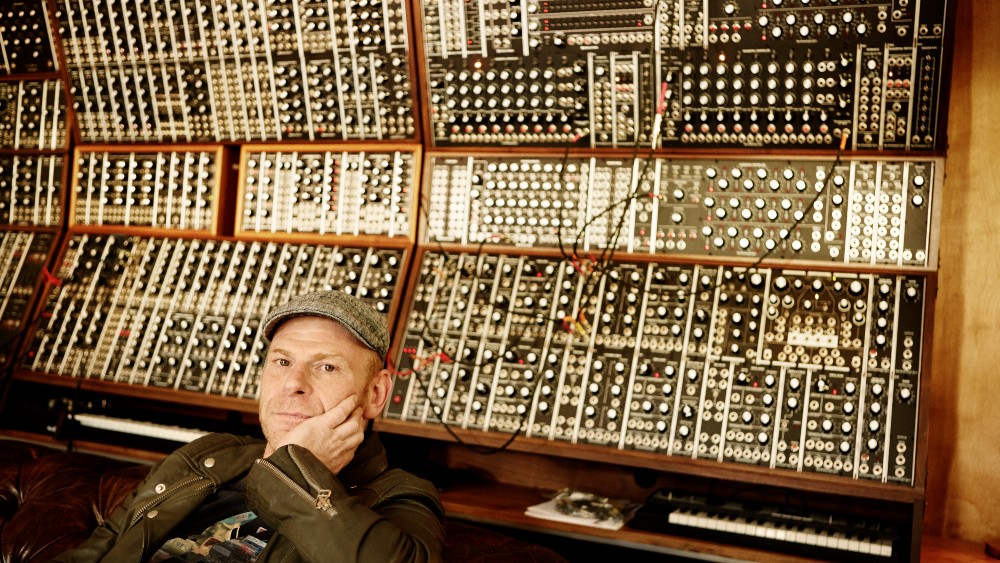
BTL: I love that great picture of you in front of your modular synthesizer, and I really wanted to get in there and see what it does. Do you get into more digital and granular synthesis where you’re putting real sounds through digital filters and things like that?
Holkenborg: Many people are under the assumption that when they see a big modular system that it’s analog by default, but that’s actually not the case. The majority of the modules that I had were digital. I actually sold the whole modular system. The only thing that says modular is that you can patch any sound the way that you want it, and you have full control over each step that you’re making a sound. That’s how it gets the name modular synthesis, but how a sound is derived, usually it’s digital nowadays, or at least digitally- controlled. The other reason why I got rid of a lot of these classic synths that I had is that they were almost impossible to work with, at a certain point. Some of them were really old. I had synths that were almost 50 years old, and they become really hard to control. They’re always out of tune. Most of the time, they don’t work. The majority of the synths would sit on the workbench of one of my tech engineers that would fix them up and keep them in a really good state. The joy to make music with that at a certain point really started to disappear.
BTL: Do you still do any live performance or tour? Is that a part of your life with the amount of music you’re making, between remixing and scoring movies, is it hard to do that stuff as live music or is that not something you do?
Holkenborg: The thing is that a lot of my composer colleagues have really discovered the idea of going on tour, whether it’s Hans Zimmer, and there are many others that perform what they did for scores in front of a live audience. It’s really great for them, because they discovered something that was never part of their life. I come from the other side. I toured for 25 years. I started touring in 1990, and I did my very last show as Junkie XL in 2012. So I’ve been touring for 22 to 24 years around the world, headlining big festivals, everything. I am happy that I’m working from home in my studio and not have to go on tour, but Hans Zimmer never went on tour, so for him, it’s like a kid in a candy store. It’s all new to him and very fresh, but not for me, because I’ve done it so many times.
BTL: I spoke to Hans maybe 15 years ago, and he sounded interested in performing his scores live, but it was still maybe 12 to 13 years before he actually went on tour. I know you worked with him on the Amazing Spider-Man 2 soundtrack a few years back, so did you play with that supergroup at the New York City premiere of the movie?
Holkenborg: I was part of the group but not during the premiere. That group was Hans and then Pharell [Williams] and Johnny Marr, and it was me and two other people. Basically, we were jamming for a couple of weeks, and that became the basis for the score of The Amazing Spider-Man 2.
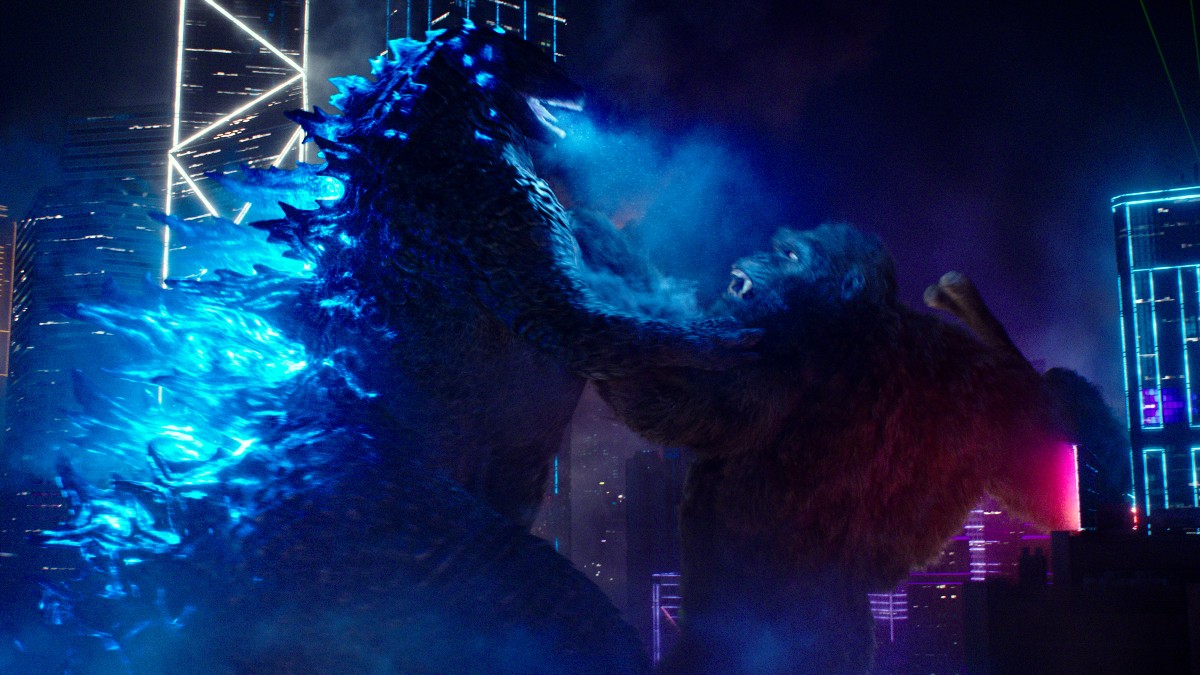
BTL: I went off on a tangent from Godzilla vs. Kong, as I often do. Did Adam have a cut for you to work from when you started working on it or were you already coming up with the melodies and themes even before seeing anything?
Holkenborg: I presented him with the two themes. One was the Godzilla theme, and the other one was the Kong theme. When he was actually shooting in Hawaii, he was playing some stuff on the set. I remember that. Usually, I start based on the script with some initial themes, and then I really start working on the film when it’s being assembled together in like a really rough cut of all the scenes and in sequence. That’s usually where I really start scene by scene basis.
BTL: Legendary had already made two other Godzilla movies and another Kong movie, so was there anyone saying that they wanted to use any of those themes for Kong or Godzilla that had already been established? Or did you just go from scratch and ignore those previous movies?
Holkenborg: The goal was to start from scratch, and then and fresh. Also, what many people don’t understand is that you’re just not allowed to use a theme of a different composer – you’re not allowed unless there’s a really complex legal structure being put in place. They did that with Bear McCreary, where they used a few bits of the original Godzilla theme for one of the movies, but you have to jump through so many legal hoops to make that possible. And there’s a lot of composers that simply refuse… like, for instance, I would have loved to use some more Brad Fidel thematics in Terminator, but I was simply not allowed — the composer didn’t allow it.
BTL: I actually was curious about that when you’re working on franchise stuff since you obviously want to give fans musical throwbacks to the mythos. I guess with “Mad Max: Fury Road” you didn’t do that either?
Holkenborg: With the Justice League, it was completely different, because I worked with Hans on Man of Steel. I worked with Hans on Batman vs. Superman, and then I continued to work on my own on Justice League. It was completely fine to use certain melodic and thematic statements in Justice League that Hans and I worked together on the two movies before. But you can’t just quote a superman theme from John Williams in your movie, you just can’t. It’s super complex.
BTL: I assume he does get credit on all those movies when they do use his original themes.
Holkenborg: I’m saying you’re not allowed to do it unless there’s a really complex legal structure put in place. I remember when Danny Elfman quoted something from John Williams in his version of Justice League, that it was a legal nightmare to get that.
BTL: You had done two previous movies with Zack, so had you already started writing a score for Justice League before Zack stepped away and before Joss Whedon came on board to finish it? Did you already have some music written and in place for some of the movie?
Holkenborg: Because Zack and I worked on the movie together for almost a year, and then Zack stepped away, and I had to step away. Then when the movie was greenlit April last year, we came back together and finished it, and I decided to start from scratch.
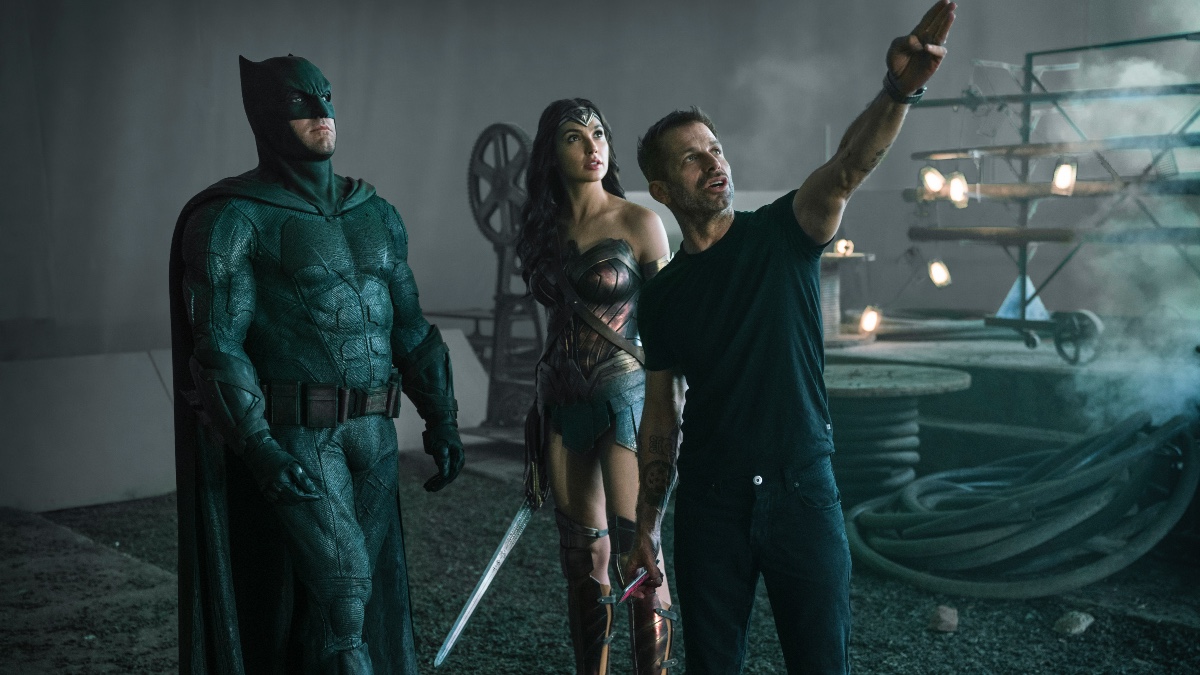
BTL: I feel like the music for the “Snyder Cut” is such a major difference, because you seem to be musically more in tune with Zack’s ethos and the way he does things, so when we hear your music over his images, it just works so well together. It’s really like night and day from the theatrical version of the movie.
Holkenborg: I have a certain approach to things, and Zack really likes that approach and vice versa. I love the way that he makes his films, the way that it looks aesthetically, and I get really inspired by the scenery that he puts together. It’s almost like it goes automatic, like what I come up with. Luckily, I also didn’t see the original version of Justice League that came out in the theaters. I never saw that, so I was also not influenced by what Joss decided to do with the final cut that came out or what Danny Elfman decided to do musically with that cut, so I just simply didn’t see it.
BTL: I did do a weird comparison where I watched the theatrical version and then Zack’s new cut with your music, and then went back to watch Joss’ version, and you can immediately see why Zack’s version works better even though it’s the same story, same characters. It’s just really interesting to analyze those differences as a film study, not to take anything away from Danny Elfman, obviously.
Holkenborg: Danny Elfman is one of the best composers that we have in Hollywood history, and so like I said, I haven’t seen this movie, but I can at least name 10 Danny Elfman scores that are of such a high level.
BTL: Yes, he’s done some amazing work. The new cut by Zack is four hours long, so how much total music did you end up writing when it was all put together?
Holkenborg: It’s almost four hours of music in the movie, yeah.
BTL: But there are a few songs, so how much do you want to know about where songs are being used in certain sections?
Holkenborg: It’s not my job, because it’s the song department’s. It does happen sometimes, and I’ve been there, too, where the composer would work with an original artist to create something unique. This movie only has like three original songs on it, as far as I remember, which is the introduction of Flash, then it’s the Nick Cave song with Aquaman, and then the Leonard Cohen “Hallelujah.” As far as I know, that’s it. So there’s three songs, and I know that Zack was already eyeing those songs. I mean, he would ask me what I thought, but he was very determined to use these songs.
BTL: But do you try to help integrate those songs into the rest of the score with your music or is that more the sound editor and mixer to make sure it works. Or do you have to transpose things a lot?
Holkenborg: No, you keep it in mind, especially if it’s an important song such as coming out of the Nick Cave song into score, where Aquaman goes under the water and we see his world. Of course, that needs to be a subtle handoff. When the song goes in, you have to analyze, “Okay, what keys is it in? How do I get out of it very naturally?” But for a movie that is four and a half hours long with only two songs in the actual film, it’s barely something to really keep in mind. It becomes more important when you, for instance, work on a movie like Deadpool where there are like 23 songs in a time span of just an hour and a half. It becomes way more important how you set up the score for a song to be dropped and how you come out of it.
BTL: How did COVID affect doing the music for Justice League?
Holkenborg: It was definitely challenging, and it definitely makes the score more intense, because I did the whole Justice League score in full isolation. I have a smaller room here in this house where I basically built my studio. And with no people around. So it was definitely more intense to do it like that. Obviously, there were all kinds of hurdles to take when it came to digital deliveries back and forth of the picture, uploading things like stems and recordings, uploading PDFs for musicians to play. Internet speed almost became a necessity to even get this project done, because of the huge amount of file transfers back and forth between so many different people, because we’re not in one one place. But it worked out.
BTL: Have you finished your Army of the Dead score with Zack already? I’m dying to hear what you do with that.
Holkenborg: That was also done like April last year or so. Basically, we pretty much finished Army of the Dead before we really got into Justice League.
BTL: Do you still have time to work on any of your own music. Is that still a regular thing to write music that’s not necessarily for someone else’s visuals?
Holkenborg: Actually, I consider everything that I make my music. I guess what you mean is do you make music outside of a movie alone? Just for the sake of it?
BTL: Sure, like do you ever wake up and say, “I want to write a song about love”? Do you ever just have a musical idea in your head that’s not necessarily l?inked to something cinematically?
Holkenberg: No, I always do that, because my output is relatively high on a yearly basis. It’s only a year that you do a four and a half hour movie that you feel like you might be short on time. In general, I spit out six to eight hours of finished music a year, so if only six hours of that is ending up in a movie, it means that roughly two hours of music is going to be made in that same year that is not going to end up in a movie and that is is there just for fun.
Zack Snyder’s Justice League can be watched on HBO Max. Godzilla vs. Kong can no longer be watched on HBO Max, but you can still go see it in theaters to hear Holkenborg’s amazing score through the loudest speaker system possible. Snyder’s Army of the Dead will hit select theaters on May 14 before hitting Netflix on May 21.
All photos of Holkenborg by Dirk Kikstra, film stills as labelled.





